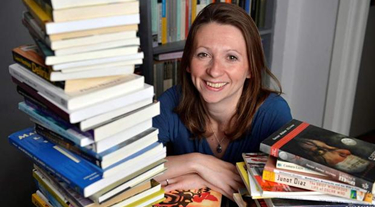Writer Ann Morgan set herself a challenge – to read a book from every country in the world in one year. She describes the experience and what she learned.
作家安·摩根决定给自己一个挑战——在一年时间里从世界所有国家的文学作品中各选一本书来阅读。 她讲述了自己的经历及体会。
I used to think of myself as a fairly cosmopolitan sort of person, but my bookshelves told a different story. Apart from a few Indian novels and the odd Australian and South African book, my literature collection consisted of British and American titles. Worse still, I hardly ever tackled anything in translation. My reading was confined to stories by English-speaking authors.
我曾认为自己是一个“海纳百川”的人,但我书架里的书却清楚地表明这并非事实。 除了一些印度小说以及澳大利亚和南非的古怪离奇的书以外,我的藏书主要是英国及美国文学。更糟糕的是,我从没有接触过任何小说译本。我读的书大多由以英语为母语的作家写就。

So, at the start of 2012, I set myself the challenge of trying to read a book from every country (well, all 195 UN-recognised states plus former UN member Taiwan) in a year to find out what I was missing.
于是,2012年伊始,我决定给自己一个挑战---在一年内读玩196本分别来自世界每一个国家和地区的书(这里是指联合国承认的195个国家以及一个前联合国成员台湾),看看我在以往的阅读中错过了什么。
With no idea how to go about this beyond a sneaking suspicion that I was unlikely to find publications from nearly 200 nations on the shelves of my local bookshop, I decided to ask the planet’s readers for help. I created a blog called A Year of Reading the World and put out an appeal for suggestions of titles that I could read in English.
开始时我感到无从下手,因为我暗暗怀疑是否能在当地书店里找到来自将近200多个国家的书,于是决定向世界各地的读者寻求帮助。我开了一个名叫“一年读世界”的博客,请大家向我推荐一些我可以用英语阅读的文章。
The response was amazing. Before I knew it, people all over the planet were getting in touch with ideas and offers of help. Some posted me books from their home countries. Others did hours of research on my behalf. In addition, several writers, like Turkmenistan’s Ak Welsapar and Panama’s Juan David Morgan, sent me unpublished translations of their novels, giving me a rare opportunity to read works otherwise unavailable to the 62% of Brits who only speak English. Even with such an extraordinary team of bibliophiles behind me, however, sourcing books was no easy task. For a start, with translations making up only around 4.5 per cent of literary works published in the UK and Ireland, getting English versions of stories was tricky.
我的要求得到了意想不到的反响。很快地,来自世界不同地区的人都在试图给我建议、提供帮助。有的人直接在帖子里附上来自他们的国家的书,有的人花费了几小时的时间来帮我做调查。除此之外,一些作家更是给我发送了他们未出版的小说译本,比如土库曼斯坦的阿克?韦尔斯帕和巴拿马的胡安?大卫?摩根。这给我了一个难得的机会,因为这些书对于占总人口62%的只会说英语的英国人来说本是读不到的。即便有爱书人组成一支特别的队伍支持我,寻找书源也绝不是一件简单的事。在英国和爱尔兰,出版的文学作品中只有4.5%的是译本,寻找一些故事的英文版是件棘手的事。
Small states
较小的国家和地区
This was particularly true for francophone and lusophone (Portuguese-speaking) African countries. There’s precious little on offer for states such as the Comoros, Madagascar, Guinea-Bissau and Mozambique – I had to rely on unpublished manuscripts for several of these. And when it came to the tiny island nation of Sao Tome & Principe, I would have been stuck without a team of volunteers in Europe and the US who translated a book of short stories by Santomean writer Olinda Beja just so that I could have something to read.
尤其是对于使用法语以及葡语的非洲国家来说,只有找到很少、很宝贵的一部分书能够被找到,比如科摩罗、马达加斯加、几内亚-比绍以及莫桑比克。对其中的一些国家,我不得不依赖于尚未出版的手稿。而对于圣多美及普林西比民主共和国这个小小的岛国,我有幸得到了一支来自欧美的志愿者团队帮助才有书可读,他们翻译了圣多美和普林西比作家奥林达?倍加短片小说。没有他们,我的读书计划难以进行下去。
Then there were places where stories are rarely written down. If you’re after a good yarn in the Marshall Islands, for example, you’re more likely to go and ask the local iroij’s (chief’s) permission to hear one of the local storytellers than you are to pick up a book. Similarly, in Niger, legends have traditionally been the preserve of griots (expert narrators-cum-musicians trained in the nation’s lore from around the age of seven). Written versions of their fascinating performances are few and far between – and can only ever capture a small part of the experience of listening for yourself.
一些地区很少用文字记录他们的故事。比如在马绍尔群岛,当你在想要听一个好故事的时候,你可能会去请求埃罗(首领)准许,然后去听一个当地说书人讲故事,而不是拿起一本书来阅读。类似地,在尼日尔,传说通常都专属于格里奥(专门的故事叙述者及音乐家,7岁开始接受本国神话传说方面的训练)。他们精彩表演的书面版本少之又少,并且即便你亲耳聆听,也只能捕获到少许。
If that wasn’t enough, politics threw me the odd curveball too. The foundation of South Sudan on 9 July 2011 – although a joyful event for its citizens, who had lived through decades of civil war to get there – posed something of a challenge. Lacking roads, hospitals, schools or basic infrastructure, the six-month-old country seemed unlikely to have published any books since its creation. If it hadn’t been for a local contact putting me in touch with writer Julia Duany, who penned me a bespoke short story, I might have had to catch a plane to Juba and try to get someone to tell me a tale face to face.
如果这还不够,政治因素更是给我出了个大难题。2011年7月9日南苏丹的建立,对于经历了数十年内战的国民来说可能是一件值的欢庆的事,某种意义上说却给我带来了一个挑战。没有公路、医院、学校或其它基础设施,这个六个月大的国家自建立以来便没有出版过任何的书。如果不是一个当地人帮助我联系上了作家茱莉亚?端妮,请她为我写下一个故事,我可能不得不飞到朱巴去找人面对面给我讲述一个故事。
All in all, tracking down stories like these took as much time as the reading and blogging. It was a tall order to fit it all in around work and many were the nights when I sat bleary-eyed into the small hours to make sure I stuck to my target of reading one book every 1.87 days.
总而言之,如此追索这些故事可能花费了和我看书、写博客差不多的时间。有时候很难找时间来完成所有的任务。有多少个夜晚我都是睡眼朦胧地看到凌晨,以确保达到平均每1.87天一本书的目标。
Head space
头脑空间
But the effort was worth it. As I made my way through the planet’s literary landscapes, extraordinary things started to happen. Far from simply armchair travelling, I found I was inhabiting the mental space of the storytellers. In the company of Bhutanese writer Kunzang Choden, I wasn’t simply visiting exotic temples, but seeing them as a local Buddhist would. Transported by the imagination of Galsan Tschinag, I wandered through the preoccupations of a shepherd boy in Mongolia’s Altai Mountains. With Nu Nu Yi as my guide, I experienced a religious festival in Myanmar from a transgender medium’s perspective.
然而所有的努力都是值得的。当我走过世界文学不同的地理风貌,不同寻常的事发生了。和那些坐在扶手椅上的旅行不同,我发现自己入住了故事讲述者们的心理世界。 在不丹作家昆赞?秋殿的陪伴下,我不仅仅是简单地参观了别具异域风情的寺庙,而是以一个当地佛教徒的身份进行了拜访。乘着格尔森?契那歌德想像的翅膀,我游走在蒙古阿尔泰山牧童的思想里。以努努依为向导,我从一个变性人的视角体验了缅甸的宗教盛典。
In the hands of gifted writers, I discovered, bookpacking offered something a physical traveller could hope to experience only rarely: it took me inside the thoughts of individuals living far away and showed me the world through their eyes. More powerful than a thousand news reports, these stories not only opened my mind to the nuts and bolts of life in other places, but opened my heart to the way people there might feel.
在这些天才作家掌握中,我发现,书带给了我一种外出旅行少有的经历:它把我带入了那些远方人们的思想当中,并且给我展示他们的双眼所观察到的世界。比成千上万新闻报道更有感染力的是,这些故事不仅让我看到了其它地区生活的点点滴滴,也让我与当地人感同身受。
And that in turn changed my thinking. Through reading the stories shared with me by bookish strangers around the globe, I realised I was not an isolated person, but part of a network that stretched all over the planet.
而这反过来改变了我原有的想法。通过读那些世界各地爱书人给我分享的书籍,我意识到我并不是一个孤立的人,而是属于一个覆盖全球的网络的一部分。
One by one, the country names on the list that had begun as an intellectual exercise at the start of the year transformed into vital, vibrant places filled with laughter, love, anger, hope and fear. Lands that had once seemed exotic and remote became close and familiar to me – places I could identify with. At its best, I learned, fiction makes the world real.
渐渐地,年初被当成智力训练而列下的国名,变成一个个充满欢笑、爱、愤怒、希望和恐惧的地方,活灵活现、意义非凡。曾经被我认为奇异和遥远的地方变得接近和熟悉---成了一个个我能清晰辨别的地方。最难能可贵的是,我学到:小说让世界变得真实。













